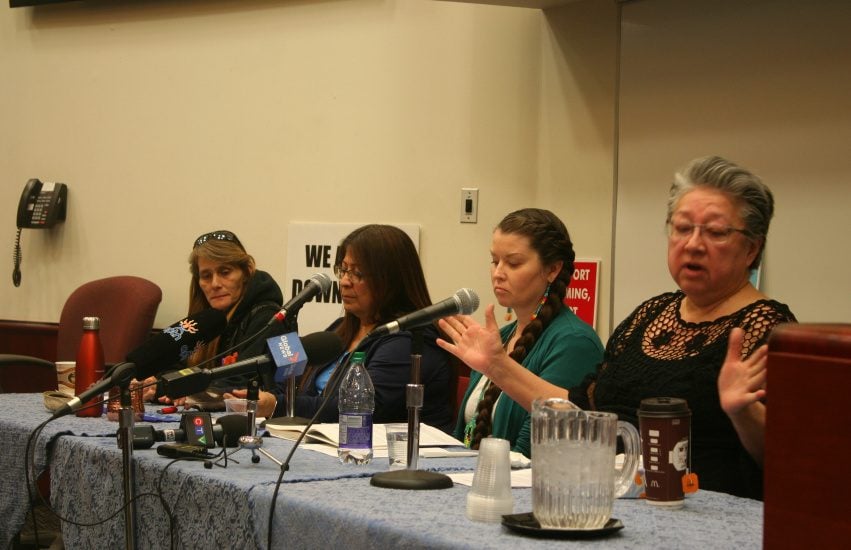
KJIPUKTUK (Halifax) – Mi’kmaq grandmothers gave notice to Alton Gas and the various levels of government that the energy giant is not welcome on unceded Mi’kmaq territory.
“We have our Elders say that they are willing to come stand on the line, and die for the protection of our lands and waters, and our Treaty rights. That is where we are today,” said water protector Dorene Bernard.
The message was delivered yesterday at a press conference and teach-in by the Treaty Beneficiary Association of the Mi’kmaw People at St Mary’s University in Halifax.
Later today the Nova Scotia Supreme Court will consider an application by Alton Gas, asking that the court remove the Treaty Truck House and its occupants.
When asked about the Alton Gas injunction in light of reconciliation Treaty scholar Michelle Paul was firm.
“It’s called Truth and Reconciliation. The truth is that this land is unceded territory and the truth is that the federal government does not hold title to this land we’re on. The question of the land has to be addressed, which is the truth before any reconciliation can occur,” she said.
Alton Gas and the provincial government have claimed that consultation with the Mi’kmaq has occurred, but grandmother and Mi’kmaq knowledge holder Elizabeth Marshall doesn’t buy it.
“The white consultants at KMKNO (Kwilmu’kw Maw-klusuaqn Negotiation Office) and the Mi’kmaq Rights Initiative and government representatives at Indian Affairs, that’s not us. So don’t be tricked. We have not been consulted one bit, and that’s why I am here,” Marshall said.
Also yesterday the Nova Scotia Utilities and Review Board (UARB) approved a construction extension for the Alton Gas project.
It did so despite environmental concerns raised by individuals and organizations, arguing that these concerns are not within the UARB’s mandate.
The Ecology Action Centre (EAC) in its submission pointed out that the earlier UARB approval was conditional on Alton Gas remaining in compliance with environmental approvals already in place.
That’s not the case, the EAC suggests, and they give examples. This pulls environmental concerns back in scope, the EAC argued.
In particular the EAC and many other submitters say that staff of the federal department of Environment and Climate Change Canada (ECCC) believe that the company’s current plan to discharge brine into a channel and subsequently into the Shubenacadie River is not in compliance with federal regulations.
The UARB also rejected a strong claim by Sipekne’katik that the band was not consulted on the project, agreeing with the Alton Gas position that this is a matter that is to be resolved by the province.
This rejection occurred despite the fact that band hasn’t heard from the Minister since the Nova Scotia Supreme Court quashed the decision by the province’s environment minister to dismiss the appeal of the First Nation in January 2017.
Ever since, a new appeal by Sipekne’katik to the department of Environment has been in limbo.
With a special thanks to our generous donors who make publication of the Nova Scotia Advocate possible.
Subscribe to the Nova Scotia Advocate weekly digest and never miss an article again. It’s free!



